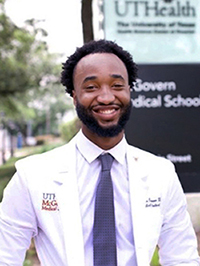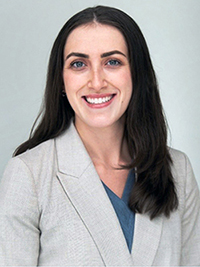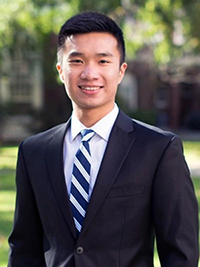For Immediate Release
Friday, July 29, 2022
Contact:
Maria Maslennikov Masm@mail.nih.gov
NIH Medical Research Scholars Program welcomes the 2022-2023 class

Charles Chukwuemeka
Osamor III
McGovern Medical School
at the University of Texas
Health Science Center at
Houston
The National Institutes of Health Medical Research Scholars Program (MRSP) class of 2022-2023 arrived at the NIH campus in July to begin their MRSP fellowship and embark upon a yearlong research experience.
The Medical Research Scholars Program is a research immersion program for future clinician-scientists that advances health by inspiring careers in biomedical research. By engaging students in basic, clinical, or translational research investigations, offering a curriculum rich in didactics and professional development, and featuring a robust mentorship and advising program, MRSP prepares its Scholars to become tomorrow's leaders in medicine and biomedical research.
“The future of medicine hinges upon developing clinician-scientists who will make and translate discoveries at the bench, achieve success against rare and refractory diseases, and address disparities in health and medicine. MRSP offers a transformational training experience that will promote students to become leaders in American medicine,” said Dr. Thomas R. Burklow, director of the MRSP.
The MRSP received 129 eligible applications for the 2022-2023 class. Upon review by a panel of NIH investigators known as the MRSP Board of Advisors, 90 applicants were interviewed. Given the ongoing COVID-19 pandemic, the MRSP conducted interviews for the class selection virtually. The interview event was held over the course of two days and included presentations from NIH investigators who have served as research mentors for MRSP scholars, current and former program participants, and the MRSP staff. Each interviewee interviewed with three NIH investigators.
After final review and evaluation, the 2022-2023 class was finalized and consists of:

Sarah Lynn
University of Minnesota
School of Dentistry
- 51 participants; 50 medical students and one dental student
- 39 represented U.S. accredited universities
- 40 third-year and 11 second-year students
- 47% female participants
Incoming scholars are enthusiastic and ready to engage in a vigorous and research driven year.
I am so thankful to have been selected to participate in the MRSP. I look forward to all the program has to offer: from experiencing a new city, meeting friends/mentors, and developing skills to be a better physician-scientist!
– Charles Chukwuemeka Osamor III, McGovern Medical School at the University of Texas Health Science Center at HoustonThis year will be an unrivaled immersion in the process of scientific discovery with mentorship from great minds in their respective fields. I am grateful for the opportunity to engage with and learn with others as we answer novel questions.
– Sarah Lynn , University of Minnesota School of DentistryThe NIH-MRSP program offers unparalleled opportunities for me to learn and grow as a physician-scientist. I am beyond excited to tackle some of the greatest health issues of our time with world-class mentors at the forefront of research.
– Yue Lin, Boston University School of Medicine

Yue Lin
Boston University
School of Medicine
The selected participants receive robust mentored training and will conduct research in areas that match their personal interests and research and career goals. The training experience forms the core of the program and allows these future clinician-scientists to carry out research across the full spectrum of science in the interest of improving public health. The scholars work with an advisor who provides guidance on creating a career development plan and on selecting an NIH research mentor. Mentors are fulltime NIH investigators with basic, clinical, or translational research programs. Over the course of the academic year, MRSP scholars participate in journal club seminars, a seminar series with invited speakers that includes both distinguished senior investigators and early-mid career clinician-scientists, and clinical teaching rounds. They also present their research to the NIH community and at national professional conferences.
The MRSP is supported by the NIH and other partners via contributions to the Foundation for the National Institutes of Health. Including the incoming class, 520 students have participated in the MRSP program since its inception in 2012.
MRSP 2022-2023 scholars:
- Sarfraz Akmal, Rutgers Robert Wood Johnson Medical School, New Brunswick, New Jersey
- Martin Arhin, University of North Carolina School of Medicine, Chapel Hill
- Bhargav Arimilli, University of Texas Southwestern Medical School, Dallas
- Thilaka Arunachalam, Albany Medical College, Albany, New York
- Santiago Avila, University of Chicago Pritzker School of Medicine, Chicago
- Taylor Badger, Southern Illinois University School of Medicine, Springfield
- Emma Byrne, Drexel University College of Medicine, Philadelphia
- Manuel Cintron, University of Illinois College of Medicine, Peoria
- Leah Cobb, Medical University of South Carolina College of Medicine, Charleston
- Rod Carlo Columbres, William Carey University College of Osteopathic Medicine, Hattiesburg, Mississippi
- Briana Cortez, University of Texas Rio Grande Valley School of Medicine, Edinburg
- Julia Denniss, Duke University School of Medicine, Durham, North Carolina
- Barrett Dryden, Washington University in St. Louis School of Medicine
- Riley Ferguson, University of Cincinnati College of Medicine
- Caitlin Foster, University of Connecticut School of Medicine, Farmington
- Thomas Gossard, Creighton University School of Medicine, Omaha, Nebraska
- Alexis Green, University of Maryland School of Medicine, Baltimore
- Dennis Gross, University of Central Florida College of Medicine, Orlando
- John Han, University of California, Irvine College of Medicine
- Pranay Hegde, Cleveland Clinic Lerner College of Medicine of Case Western Reserve University
- Gerard Hoeltzel, Sidney Kimmel Medical College at Thomas Jefferson University, Philadelphia
- Jordan Juarez, Lewis Katz School of Medicine at Temple University, Philadelphia
- Conor Kelly, Georgetown University School of Medicine, Washington, D.C.
- Suzie Kim, Cleveland Clinic Lerner College of Medicine of Case Western Reserve University
- Rebecca Kuan, Western University - College of Osteopathic Medicine of the Pacific, Pomona, California
- Christina La Gamma, Pennsylvania State College of Medicine, Hershey
- Riley Larkin, University of Miami Miller School of Medicine
- Yue Lin, Boston University School of Medicine
- Keagan Lipak, Ohio University College of Osteopathic Medicine, Athens
- Sarah Lynn, University of Minnesota School of Dentistry, Minneapolis
- J. Alberto Maldonado, University of Texas Medical Branch John Sealy School of Medicine, Galveston
- Danielle McAuliffe, Lewis Katz School of Medicine at Temple University, Philadelphia
- Kelsey Mumford, University of Texas at Austin - Dell Medical School
- Fiona Obiezu, David Geffen School of Medicine at the University of California, Los Angeles
- Charles Osamor III, McGovern Medical School at the University of Texas Health Science Center at Houston
- Rebecca Oyetoro, University of Florida College of Medicine, Gainesville
- Zeynep Ozgur, Northeast Ohio Medical University College of Medicine, Rootstown
- Maeve Pascoe, Cleveland Clinic Lerner College of Medicine of Case Western Reserve University
- Abdelrahman Rahmy, Cleveland Clinic Lerner College of Medicine of Case Western Reserve University
- Magdalena Rainey, Cleveland Clinic Lerner College of Medicine of Case Western Reserve University
- Anirudh Rao, Drexel University College of Medicine, Philadelphia
- Aaron Sheppard, Louisiana State University School of Medicine in Shreveport
- Julie Solomon, Washington University in St. Louis School of Medicine
- Trevor Stantliff, University of Cincinnati College of Medicine
- Joshua Stark, University of Tennessee Health Science Center College of Medicine, Memphis
- Eszter Toth, Medical College of Georgia at Augusta University
- Rajiv Trehan, Rutgers Robert Wood Johnson Medical School, Brunswick, New Jersey
- Alex Valenzuela, Charles R. Drew University of Medicine and Sciences
- Sarita Walvekar, Cleveland Clinic Lerner College of Medicine of Case Western Reserve University
- Philip Wang, Cleveland Clinic Lerner College of Medicine of Case Western Reserve University
- Georgina Whelan, Cleveland Clinic Lerner College of Medicine of Case Western Reserve University
###
About the NIH Clinical Center: The NIH Clinical Center is the world’s largest hospital entirely devoted to clinical research. It is a national resource that makes it possible to rapidly translate scientific observations and laboratory discoveries into new approaches for diagnosing, treating, and preventing disease. Over 1,600 clinical research studies are conducted at the NIH Clinical Center, including those focused on cancer, infectious diseases, blood disorders, heart disease, lung disease, alcoholism and drug abuse. For more information about the Clinical Center, visit: https://www.cc.nih.gov/.
About the National Institutes of Health (NIH): NIH, the nation's medical research agency, includes 27 Institutes and Centers and is a component of the U.S. Department of Health and Human Services. NIH is the primary federal agency conducting and supporting basic, clinical, and translational medical research, and is investigating the causes, treatments, and cures for both common and rare diseases. For more information about NIH and its programs, visit www.nih.gov.

